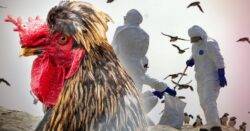Bird flu has killed countless birds worldwide (Picture: Getty / PA)
After years of Covid-19 upending everyone’s lives, a gnawing question is on people’s minds: When will the next pandemic be?
The World Health Organisation (WHO) calls this ‘Disease X’, a new mysterious pathogen that might be different, or similar, to the coronavirus.
But could the next pandemic be bird flu?
Over the last two years, a massive bird flu outbreak has infected and killed countless birds and devasted the poultry industry – and there have been some reports of it sickening people, too.
Experts told Metro.co.uk that, yes, they are worried about bird flu – but stress that people don’t have to be anytime soon.
What is bird flu?
Avian influenza, better known as bird flu, is a group of flu viruses that have adapted to sicken birds in particular.
Not all bird flu strains are the same. But some, like the H5N1 behind the latest outbreak, are highly contagious and can tear through local bird populations such as ducks, geese and swans as well as farms and backyard flocks.
The bird flu virus is sneaky, spreading through bird droppings, saliva and nasal secretions which means it’s difficult to contain.
H3N2 is one example of a strain of avian influenza, usually known as bird flu (Picture: Getty Images/Science Photo Libra)
Birds infected with bird flu tend to become sluggish and the mortality rate is high (Picture: AFP)
For a bird sickened by the disease, symptoms include a lack of appetite, a drop in egg-making and an increase in mortality in their flock.
Philip Gould, the deputy head of school at Coventry University’s School of Life Sciences, tells Metro.co.uk: ‘We are all used to the flu – but that’s the human version of it.
‘In the animal kingdom, there are equivalent versions and birds have bird flu.
‘A lot of it can cause death in wild birds and it can travel from wild populations to poultry flocks, causing disease among the animals.’
Is there bird flu in the UK in 2023?
The UK Health Security Agency (UKHSA) says there have been 286 cases of H5N1 since October 2021 (182 were from October 2022, among the worst outbreaks in British history).
Can bird flu be passed on to humans?
It has been known to spread from bird to human, but human to human? Not so much, Gould says.
‘Typically, it’s restricted to just birds because the virus has evolved to infect birds,’ Gould says.
Dozens of swans have been found dead in recent months (Picture: Getty)
‘What can occasionally happen is that it can infect humans but it’s not very efficient.’
Human infections can happen if the virus comes into contact with a person’s eyes, nose or mouth, or is inhaled.
Humans only tend to catch bird flu if they are very close to infected birds, such as farm workers involved in the plucking or killing of poultry.
‘Typically, if someone is exposed to bird flu, the infection won’t happen, but in a small number of occasions it will,’ Gould adds.
The UKHSA stresses that bird flu primarily poses a problem for birds and humans have little to worry about.
What are the symptoms of bird flu in humans?
According to the NHS, general early symptoms of bird flu strains include fevers, aching muscles, headaches, coughing and, in some cases, stomach and chest pain.
Sometimes, the symptoms curdle into more serious ones such as pneumonia and acute respiratory distress syndrome.
Is it safe to eat poultry and eggs?
Yes, according to the Food Standards Agency (FSA).
Properly cooked poultry and poultry products, including eggs, are safe to eat.
Food officials say that it’s perfectly fine to eat eggs (Picture: AFP)
While the government made some precautions – such as locking egg-laying hens indoors for five months or culling millions of birds – most of these have since ended.
What about bird flu being seen in two people this week?
The UKHSA said on Tuesday that bird flu was detected in two people working at an infected poultry farm in England.
The positive tests were picked up through a routine screening programme for people who have come into close contact with sick birds.
The UKHSA has warned people to avoid touching sick or dead birds (Picture: Getty Images/Mint Images RF)
Both are asymptomatic and have since tested negative. Officials aren’t sure how they became infected – one, they said, probably caught it from inhaling infected bird secretions.
There’s no evidence that one person caught the virus from the other, the UKHSA said, and the cases don’t change it considering bird flu as ‘low risk’.
The two cases are the latest since January 2022 when a person living in south-west England was found to be infected – again, there was no cause for concern about onward transmission.
Can bird flu be passed on to other animals?
The current outbreak has spilt over into other mammals including minks, otters, foxes and bears.
Though, some scientists say bird flu likely hasn’t changed its genetic makeup to be able to freely infect other mammals – it has impacted other mammals before but only very rarely.
The critters likely scavenged on the carcasses of birds that had fallen ill with the virus.
But could it become a pandemic?
Maybe, says Dr Nicole Robb, an assistant professor at Warwick University, Oxford University lecturer, and co-founder of health tech company Pictura Bio.
‘An imminent avian flu pandemic is unlikely but not impossible,’ she says.
‘Looking back at trends over the last century there have been six major pandemics and outbreak frequency has accelerated significantly over the last 20 years.’
Behind the current outbreak is the strain called Eurasian H5N1, but it tends to be just called ‘bird flu’ and has actually caused other outbreaks in the past.
The strain can be traced back to the Guangdong Province of southern China in 1996, according to the World Health Organisation (WHO).
Bird flu is endemic in most wild bird populations and a single bird can infect as many as 100 others in what’s called a panzootic, or an outbreak among animals.
Tallying the number of death in wildlife is already a tall order for officials but is especially tough for birds, some of which casually fly across entire oceans.
But what they have seen is devastating. The virus has killed dozens of critically endangered California condors in the US, for example, among the 6,700 wild birds detected with the flu.
Experts called on health officials and governments to be on the alert (Picture: PA)
While millions of birds have been killed in the UK and rescuers had to kayak into ponds to recover dead swans last year.
The NHS says that the H5NI strain doesn’t ‘infect people easily’, though when it does, it has a mortality rate of around 50%, researchers say.
Researchers warn that the virus is only a few mutations or a sudden gene swap away from being able to spread from human to human.
As Dr Robb says: ‘To date, there have been no sustained cases of human-to-human transmission.
‘However, if it does happen it will be a serious situation.’
‘The biggest worry is that if bird flu can adapt or mix with a human strain at the same time, a new version of the virus could occur, but this is very, very, very rare,’ adds Gould.
After all, what’s terrifying when it comes to pandemics isn’t the death toll but the growth rate; and the bird flu virus is doing a very bad job at infecting people, health officials say.
Could it happen anytime soon?
It’s hard to say. But much like the common cold, bird flu tends to thrive more in the colder months – and the mercury is rising fast now as summer approaches.
‘It’s pretty seasonal, cases occur in waves and, in particular, over the winter months,’ Gould says.
This isn’t to say it can’t happen one day, though, adds Dr Robb.
‘As the global population grows, humans are moving into previously uninhabited areas, meaning more humans come into contact with wildlife which increases the risk,’ she says.
‘Whether it’s H5N1 or a different virus, it is inevitable that new viruses will continue to emerge and threaten another pandemic.’
Is there a bird flu vaccine?
‘The good news is, unlike when COVID-19 emerged, H5N1 has been around for 20 years so we already have tests and vaccines,’ says Dr Robb.
‘However, none of this is available at scale. The UK’s diagnostic testing capabilities are not advanced enough to deal with an influenza spill-over event from birds to humans quickly and efficiently.’
Dr Robb urged health officials to shake vaccine makers into action and invest more money into preparing for the worse; bird flu urgently needs more attention.
The strain tearing through birds right now, H5N1, already has a vaccine (Picture: Reuters)
Post-Covid fatigue is real but governments have to act now by tracking strains, testing birds and rolling out vaccines by sharing data with vaccine-makers.
‘It took far too long to get community testing up and running with COVID which enabled the virus to spread,’ she adds, ‘COVID could have had much less of an impact if we had rapid community testing from the start.’
Officials must keep an eye on bird flu to see if the virus’ inner machinery – called genomes – is changing in any way that could make it more of a threat to people.
It’s better to be safe than sorry, Gould says, even if it’s very possible that a bird flu pandemic will never happen.
‘The bird flu virus is really optimised and designed in evolution to infect birds,’ Gould adds, ‘so to infect humans is a difficult process when it’s not evolved to do that.’
For more stories like this, check our news page.
‘If it does happen it will be a serious situation.’





